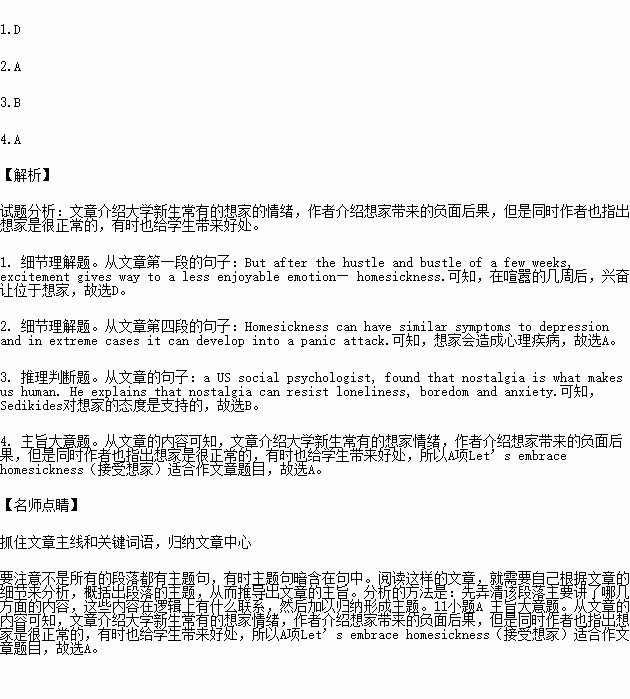题目内容
September is an exciting month in every college freshman’s life. For many, it’s the first time that they’ve left home to live in a new environment. But after the hustle and bustle (喧嚣) of a few weeks, excitement gives way to a less enjoyable emotion—homesickness.
Homesickness manifests (显露) itself in many ways. You may miss mum’s cooking, your pets, or even your old bed. All this becomes a fond memory of the past. Homesickness can be a bitter feeling for many students, especially when faced with the challenges of settling into an unfamiliar environment.
But remember, you’re not alone. According to a recent BBC article, 70 percent of British college students experience homesickness. In this increasingly globalized world in which people migrate to faraway places for a relationship, education or work, homesickness is a feeling shared by many adults.
Homesickness can have similar symptoms to depression and in extreme cases it can develop into a panic attack. As for the term, homesickness or nostalgia wasn’t invented until the 17th century. It was considered a disorder by a Swiss physician, who attributed soldiers’ mental and physical discomfort to their longing to return home, “nostos” from Greek, and the accompanying pain, “algos”.
Studies in recent years, however, have shown that nostalgia may have some benefits to our mental health. After a decade of surveys and researches, Constantine Sedikides, a US social psychologist, found that nostalgia is what makes us human. He explains that nostalgia can resist loneliness, boredom and anxiety. Therefore, it’s necessary for college students to learn some ways to overcome the uncomfortable feeling.
1.From the first two paragraphs, we can infer that ________.
A. homesickness means a fond memory of the past
B. only a few students will experience homesickness
C. homesickness is an enjoyable emotion among freshmen
D. college freshmen usually suffer from homesickness after weeks
2.According to the passage, we can know that ________.
A. homesickness may cause mental diseases
B. homesickness is a feeling only shared by adults
C. homesickness won’t do any good to our health
D. homesickness is also called nostalgia in Switzerland
3.The attitude of Sedikides towards homesickness is ________.
A. negativeB. supportiveC. doubtfulD. critical
4.What is the best title for the passage?
A. Let’s accept homesickness
B. How to fit in with the college life
C. A harmful emotion—homesickness
D. The disadvantages of homesickness
假设你是李明,你在报纸上看到一个广告,很感兴趣,但有些具体细节不清楚。请你根据下面电子信箱地址发封邮件,询问有关情况。
Wanted |
Young person to help with two children Help with languages very welcome Must have experience Accommodation available if necessary E-mail: Cook@hotmail.com |
1. Hours?
2. Which languages? How many?
3. Experience of teaching or caring for children?
4. How about meals?
注意:1.词数100左右;
2.开头和结尾已给出,不计入总词数。
Dear Sir/Madam,
_______________________________________________________________________________
_______________________________________________________________________________
_______________________________________________________________________________
_______________________________________________________________________________
_______________________________________________________________________________
_______________________________________________________________________________
_______________________________________________________________________________
_______________________________________________________________________________
_______________________________________________________________________________
Yours truly,
Li Ming

